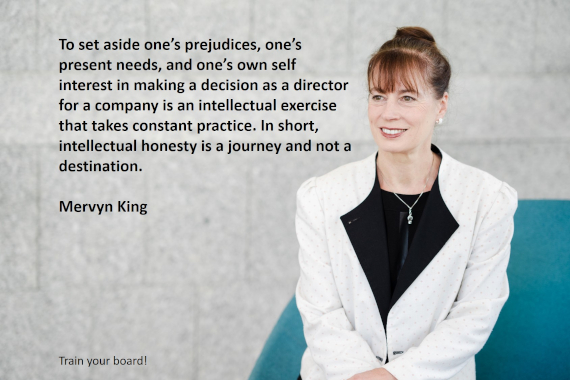|
|
|
|
|
|
|
|
|
Dear reader,
Welcome to the December 2020 edition of The Director's Dilemma. Each month this newsletter looks at a real-life scenario that happened to a board, perhaps to a board like yours, and considers a range of responses. The scenarios are de-identified to protect the individuals concerned.
Our dilemma this month looks considers acceptable standards of diligence, and how to recover – or at least reduce the impact – from director negligence.
I have over twenty-two years' experience consulting to, and serving on, boards. It is a pleasure to share some of it with you in this newsletter and I would be even more delighted to share it with you when your board needs a performance review, strategy workshop, or director education session.
To read this email in a web browser, go to www.mclellan.com.au/newsletter.html and click on 'read the latest issue'. I hope you will enjoy the latest dilemma:
 Cadenza is an entrepreneur. Like many other entrepreneurs, she needed additional income to survive while waiting for her business to become profitable. Cadenza provided consulting services to another entrepreneur. As that entrepreneur also became short of funds, after a while Cadenza was paid in equity and given a board seat, rather than being paid in cash. Cadenza is an entrepreneur. Like many other entrepreneurs, she needed additional income to survive while waiting for her business to become profitable. Cadenza provided consulting services to another entrepreneur. As that entrepreneur also became short of funds, after a while Cadenza was paid in equity and given a board seat, rather than being paid in cash.
Cadenza's own business began to thrive, it kept her very busy, and she paid little heed to the business of her former client. She stopped receiving board papers and attending board meetings.
Now a shareholder from the other entrepreneur's company has asked Cadenza what is going on there. Cadenza called her former client (who is the CEO of that company) and asked for an update.
The news is mixed. For a while, things went well, and the company successfully raised capital and gained new shareholders. Then progress stagnated and it appears that some company assets were transferred to the CEO, or perhaps just sold with the proceeds going to the CEO, before a dilutionary capital raising and some agreements that reward the CEO for intellectual property which once belonged to the company.
The CEO said that the shareholder has been 'causing trouble' for a while, asking for information and threatening to take legal action. The CEO asked Cadenza to ignore the shareholder and take no further action.
Cadenza is now worried. She knows that she has not fulfilled her duty as a director. She is still listed with the authorities as a director of the company. Is there any way that she can protect her reputation, and reduce repercussions from her lack of attention?
|
|
|
|
Ron's Answer
 Cadenza has clearly breached her duties as a director, namely her duty to exercise reasonable care and diligence (s 180), by failing to keep herself informed about the activities of the Company (ASIC v Healey). Cadenza has clearly breached her duties as a director, namely her duty to exercise reasonable care and diligence (s 180), by failing to keep herself informed about the activities of the Company (ASIC v Healey).
As a director, Cadenza had a clear obligation to act in the best interests of the Company as a whole, rather than in the interests of a particular shareholder (s 181; The Belle Group Ltd v Westpac Banking Corp (No. 9)).
She is potentially liable in damages for breach of directors duties. She could also be liable to pay a financial penalty of up to $200,000 (s 1317G), as well as the potential to be disqualified as a director (s 206C).
Resigning as a director is not an option.
In these circumstances, Cadenza should do all that is possible to mitigate the situation by taking various steps, including:
-
formally requesting the CEO, in writing, to provide full details and copies of the documents that transferred or sold the assets to the CEO (s 198F(1));
-
convening a meeting of shareholders as a director to discuss the transfer or sale of Company assets for the apparent benefit of the CEO (s 249C);
-
if the CEO has refused to supply such details and copies of the transaction documents, the shareholders could apply to the Court for an order to inspect the books and records of the Company (s 247A(1)); and
-
Cadenza could also recommend to shareholders that they bring a derivative action against the CEO (s 236).
Importantly, the Company is regarded as the proper plaintiff in such circumstances and therefore any proceeds which flow from the derivative suit would be recovered for the Company (Foss v Harbottle).
Finally, Cadenza should seek advice from a good corporate commercial lawyer as to how best protect her own position.
Ron Heinrich is Chairman of Assetlink Group, Director of Go Gentle Australia, Farmlink Research Ltd, Intersales Temora and The Commonwealth Law Association. He is also a Partner at HBL Ebsworth Lawyers. He is based in Sydney, Australia.
|
|
|
|
Julie's Answer

The best way to manage the risks of directorship is to do the job diligently.
Cadenza's lack of attention to her duties could have serious repercussions. She has four options:
Lie; claim she resigned when she stopped working with the CEO and that she expected the CEO to file the paperwork to that effect. This is stupidly risky and - if unsuccessful – she will have perjury and other deceptions added to her negligence.
Stay quiet and on the board; hope the CEO will sort it out. This is extremely high risk. If she allows the company to misappropriate assets, she could incur personal liability and be guilty of inaccurate reporting.
Resign fast; hope the CEO will sort it out. This is very high risk. There is probably evidence of the timing of asset transfers and she was on the board when they occurred.
Start doing the job; get a full briefing on what has happened at the company, where the assets have gone, what the CEO has done, and what are the prospects for reinstating any disputed assets. This is high risk.
Option 4 is, to me, the only ethical solution and the least risky.
To succeed, Cadenza will need to re-establish a good working relationship with the CEO. Her duty is to the company. She must ensure the CEO properly accounts, then either returns, or pays the company for, any assets appropriated and sold. She must also understand the positions of the major shareholders and the background to the capital raising.
Intellectual property is often contentious in small start and scale up companies. CEOs may feel that it is their know-how, shareholders may feel it is the company's asset. Cadenza needs legal help identifying what belonged to whom and setting in place good systems to control intellectual property and other assets.
Julie Garland McLellan is a non-executive director and board consultant based in Sydney, Australia.
|
|
|
|
Albert's Answer
 Is there a good way out of this for Cadenza? (or for the CEO or for the shareholder?). Is there a good way out of this for Cadenza? (or for the CEO or for the shareholder?).
Cadenza has obviously failed to fulfil her duties as a Non-Executive Director and by her own admission took no notice of the board packs that were sent and didn't attend any meetings as her business activity increased.
In truth, the shareholder (the investor!) who speaks up, and goes to Cadenza the NED, after trying to get info through the CEO is right to do so and has taken the right steps. But until now, the news that things might be wrong, only appeared to be wrong, with no proven facts known yet to Cadenza, or shareholder for sure.
So what should Cadenza do?
-
She can still act on the rumours! She is still on the board and can fulfil her role by conducting her own due diligence by reviewing past board papers, financial statements, supporting materials and meeting minutes etc. that were sent to her in the past to work on proving the rumours right or wrong, in the interest of company and shareholders.
-
If she does not have the most recent board papers, she should request them from the company secretary.
-
To reduce her reputation damage, she should act immediately towards the CEO and the company, informing the shareholder that she is on a fact-finding mission, and that she will act according to her findings.
-
Based on her findings, she might inform the authorities, either confirming or negating the shareholders suspicions.
-
And if her findings show the rumours are true, she can explain that she was just in time, but acknowledge to the authorities that she should be more attentive next time and that she learned a lesson.
-
She should consult a lawyer about possible legal actions from the shareholder, the authorities or even the CEO.
-
If leaked to the press / media, a comprehensive media statement should also be prepared that is approved by the lawyer and the board at large.
Albert Froom is Managing Partner at Leaders Trust and Global Practice Leader Financial Services at AltoPartners Netherlands. He is based in The Randstad, Netherlands.
|
|
|
|
Book Review – Lead Together by Brent Lowe, Susan Basterfield and Travis Marsh

"Leadership and Power are possibly the two most loaded words in business". So begins this insightful book. It goes on to give practical tools and instances for applying leadership and power in purposefully measured amounts at the precise times when it is needed.
The chapter on decision-making is compulsive reading. Once you start the ideas just resonate and reinforce each other to leave the reader feeling enriched. The different types of decision are clearly identifiable and there are helpful tips on which type to use in which situation and also a hard look at the disadvantages of each type.
Although the target audience is the leadership team of fast-growing scale-up companies the book translates effortlessly to practical applications for boards and those who work with boards. It is a little bit large for a stocking filler and is likely to be a winner if placed under a director's Christmas tree. Just don't be surprised if the recipient starts reading and stops socialising as soon as they pick it up!
Available on amazon.com
Inspirational quote for December – One of my all-time favourite quotes

A note on names - A few readers have asked me where I find the names for the protagonists in each case study; I 'borrow' them from people I meet or things that I read. Cadenza is a modern girl's name and derived from the name of a piece of music within a larger piece of music; most typically a virtuoso performance that may be improvised or written by the soloist, rather than written by the composer of the larger piece. Our protagonist will need to create a real virtuoso governance performance if she is to snatch some kind of victory from the jaws of this potential defeat.
This newsletter - If you have any ideas for improving the newsletter please let me know. If you are reading a forwarded copy, please visit my website and sign up for your own subscription.
Suggestions for dilemmas - Thank you to all the readers who have suggested dilemmas. They are greatly appreciated. I will answer them all eventually. I could not write this newsletter without your help and without the generous help of all the experts who respond each month to the case studies.
Be a contributor - If you would like to attempt a response to the dilemmas for publication you will be most welcome. Simply reply to this email and let me know.
Let's connect - I use LinkedIn to share information about boards and directorship with my friends and acquaintances. If you use LinkedIn and we are not yet connected I will welcome a connection from you. You can find me at linkedin.com/in/juliegarlandmclellan.
Let me help you - If you would like me to speak to or train your board, staff, audience and/or group please contact me at julie@mclellan.com.au.
Farewell until the next issue due 1 February 2021. I look forward to greeting you again then. In the interim I hope you will enjoy health, happiness and hard work: Happy Christmas and very best wishes for a really great 2021.
Best regards,
Julie

Main Photo by Startup Stock Photos from Pexels
Quote Photo by Joyce Ong
Photo Credits: Personal images in this newsletter are provided courtesy of the contributors, course attendees and conference participants.
Disclaimer:
The opinions expressed above are general in nature and are designed to help you to develop your judgement as a director. They are not a definitive legal ruling and do not constitute legal advice. Names and some circumstances in the case study have been changed to ensure anonymity. Contributors to this newsletter comment in the context of their own jurisdiction; readers should check their local laws and regulations as they may be very different.
Privacy: I am privileged to have your contact details and keep them as safely as possible. I will alert you if they are ever accessed by any unauthorised person (the technical staff at ayuda help with publishing and issuing the Director's Dilemma and have access so they can send the newsletters to you). I do not sell your details to anyone; they are kept only for the intended purpose - sending you this newsletter and helping to build the judgement of company directors by providing a safe way to consider potential responses to real life events.
|
|
|
|
|
|
|
 Cadenza is an entrepreneur. Like many other entrepreneurs, she needed additional income to survive while waiting for her business to become profitable. Cadenza provided consulting services to another entrepreneur. As that entrepreneur also became short of funds, after a while Cadenza was paid in equity and given a board seat, rather than being paid in cash.
Cadenza is an entrepreneur. Like many other entrepreneurs, she needed additional income to survive while waiting for her business to become profitable. Cadenza provided consulting services to another entrepreneur. As that entrepreneur also became short of funds, after a while Cadenza was paid in equity and given a board seat, rather than being paid in cash.
 Cadenza has clearly breached her duties as a director, namely her duty to exercise reasonable care and diligence (s 180), by failing to keep herself informed about the activities of the Company (ASIC v Healey).
Cadenza has clearly breached her duties as a director, namely her duty to exercise reasonable care and diligence (s 180), by failing to keep herself informed about the activities of the Company (ASIC v Healey).
 Is there a good way out of this for Cadenza? (or for the CEO or for the shareholder?).
Is there a good way out of this for Cadenza? (or for the CEO or for the shareholder?).

